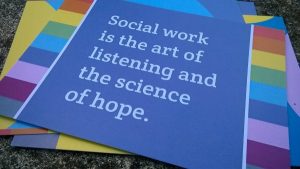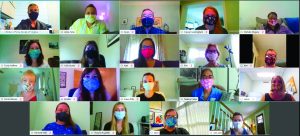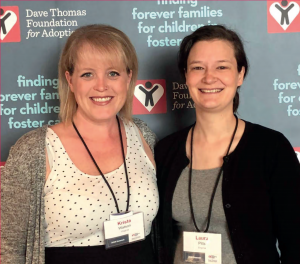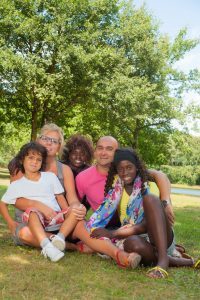 March is National Social Work Month, and the theme this year is “Social Workers Are Essential.”
March is National Social Work Month, and the theme this year is “Social Workers Are Essential.”
Below we discuss what social work is, what social workers do, and highlight the amazing social workers who work for the Children’s Home Society of Virginia.
“Celebrating National Social Work month doesn’t come with a parade, party, or confetti, but it does come with knowing that you make a difference.” Laura Ash-Brackley, Former Chief Programs Officer
What is Social Work?
 Social work is a practice-based profession that promotes social change and development, social cohesions, and the empowerment and liberation of people. Social work engages people and structures to address life challenges and to enhance wellbeing. Advocating and upholding human rights and social justice is the motivation and justification for social work.
Social work is a practice-based profession that promotes social change and development, social cohesions, and the empowerment and liberation of people. Social work engages people and structures to address life challenges and to enhance wellbeing. Advocating and upholding human rights and social justice is the motivation and justification for social work.
“Social Work is a profession of unsung heroes who quietly confront some of the most challenging issues in society. Social workers forge solutions to problems great and small, serving individuals, families, and communities. They help people when they are hurt, vulnerable, and often at their very worst.”
What Do Social Workers Do?
Social workers engage with many different populations and types of people, particularly focusing on those who are vulnerable, oppressed, and living in poverty.
Social workers can be found everywhere from schools, hospitals, and mental health clinics to senior centers and prisons.
Social workers help clients who face a disability or a life-threatening disease or social problems such as inadequate housing, unemployment, or substance abuse. Social workers also help families that have serious domestic conflicts like child or spousal abuse.
Some social workers conduct research and participate in legislative processes that often result in the formation of social policies.
“Social workers help people when they are hurt, vulnerable, and often at their very worst. Social workers can hear the pain and sit with the suffering while providing compassion, empathy, and support.”
Below are the different types of social workers:
- Administration and Management
- Advocacy and Community Organization
- Aging
- Child Welfare
- Development Disabilities
- Health Care
- International Social Work
- Justice and Corrections
- Mental Health and Clinical Social Work
- Mental Health and Substance Abuse Social Work
- Occupational and Employee Assistance Program Social Work
- Policy and Planning
- Politics
- Public Welfare
- Research
- School Social Work
Social work has been around for more than 120 years in the United States. There are currently more than 700,000 professional social workers employed in the United States and more than three million worldwide. Social work continues to be one of the fastest-growing professions in the country.
Social Worker Training
At a minimum, social workers need a bachelor’s degree in social work. However, many social workers go on to earn their master’s degree. All clinical social workers must hold a master’s degree. Social workers who work in a clinical setting must fulfill at least two years of supervised work experience before earning a license.
Graduate-level study and clinicals also train social workers to diagnose and treat people suffering from mental illnesses or emotional issues.
“At CHS, our social workers, help match children and teens with families who can meet their needs, and guide families through our services. They listen, they respond, and they help to make others stronger, sounder and more resilient.”
Social Workers at Children’s Home Society of Virginia
 The social workers at CHS are specifically trained for youth, young adults, and foster care youth.
The social workers at CHS are specifically trained for youth, young adults, and foster care youth.
All our social workers undergo Trust-Based Relational Intervention (TBRI) training.
Children and youth who have experienced foster care have often experienced complex developmental trauma, demonstrating an interactive set of psychological and behavioral issues. Trust-Based Relational Intervention (TBRI) is a therapeutic model that trains social workers to provide effective support and treatment for at-risk children.
All of our social workers have extensive experience with departments of social services or child welfare services.
Our Foster Care Adoption Program, Post Adoption Program, and My Path Forward Program are all staffed by social workers.
“We have front-line workers in our agency. Everything policy-wise we manage goes through the social work team so there aren’t unintended consequences and so we know that the policies will be helping the population effectively.” Cassie Cunningham, CHS Policy Director
We pride ourselves on the low turnover rate our organization has when it comes to social workers.
“Compared to some other organizations, our social workers stay with us for a long time. Our social workers are given the tools they need to thrive and are involved in high-level administrative and policy decisions, making them feel appreciated, recognized, and empowered.” Dave Martin, Chief Marketing Officer
Because of our low turnover rate, the youth we work with experience more stability and form long-term relationships with our social workers, which is extremely important.
Social Worker Accomplishments at Children’s Home Society of Virginia
Unfortunately, social workers tend to be overlooked and underpaid. However, the General Assembly just passed a bill that will raise the local department of social services caseworker’s salaries by 20%! Typically, the starting salary for a DSS social worker is only $27,000, and there is a 50% turnover rate for caseworkers each year. This salary increase will stabilize the workforce.
This salary increase was something the CHS Advocacy Program members pushed for during this year’s General Assembly, and we are extremely excited the budget amendment was passed.
In 2004, CHS became one of the first Wendy’s Wonderful Kids (WWK) program sites in the country. WWK is the signature program of the Dave Thomas Foundation for Adoption.
The Foundation funds adoption professionals, known as recruiters, who use a child-focused model to find permanent homes for children in foster care.
Each year, many children in foster care turn 18 and leave the child welfare system without permanent families. The WWK’s recruiters work with smaller caseloads of children, ensuring they can focus dedicated time to matching children waiting in foster care the longest with families planning to adopt.

CHS’ WWK recruiter, Krista Watson, has been working for a decade to match youth still waiting in Virginia’s foster care system with families. Krista recently celebrated ten years of work with CHS as a WWK recruiter. Because of Krista’s decade of steadfast work, 89 youth have found permanence in loving homes through adoption.
Celebrating Social Work Month
Social work is a very challenging job. Working with kids who have suffered severe trauma is emotionally taxing, and our social workers do it every day. They are constantly immersed in the pain of our youth but continually fight for better outcomes.
One example of a better outcome is when one of our youth, Lila, was adopted two days before her eighteenth birthday. Lila continually experienced severe seizures but after our social workers found her a loving, permanent home, Lila recovered from her seizures! Love is powerful, and when kids are truly cared for, they can begin to heal.
Social workers advocate and serve others and understand the importance of human relationships, dignity, and self-worth. They give a voice to the voiceless, power to the powerless, and help to the helpless.
Social workers spend their time with the neediest and the most vulnerable—willingly giving of themselves so that others may be empowered.
We are extremely thankful to all of our social workers, at CHS and beyond, for the hard work they do that often goes unnoticed. We see you! You’re making a difference in the lives of so many and changing the world for the better.
Please share this blog to spread the word about all the amazing work social workers do!

